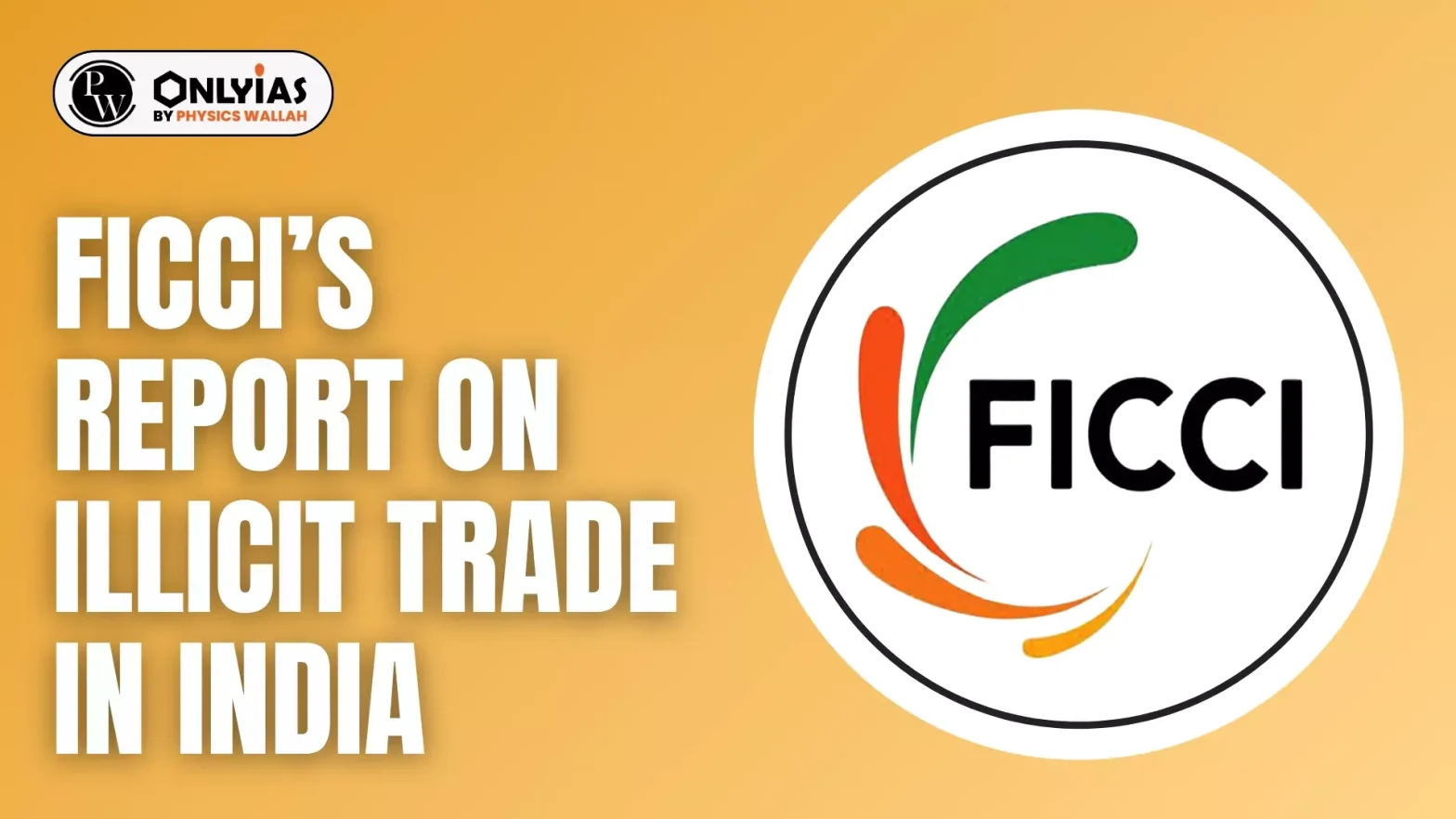Context
Recently, FICCI CASCADE reported on illicit markets associated with financial flows and revealed their linkages with organized crime and terrorism.
| Relevancy for Prelims: Illicit Trade, Global Terrorism Index (GTI), UN Office of Drugs and Crimes (UNODC), Golden Triangle, Financial Action Task Force (FATF), Global Crime Index, and National Investigation Agency (NIA).
Relevancy for Mains: FICCI’s Report on India’s Illegal Economy, Linkages of Illicit Trade, Challenges Associated with Linkages of Illicit Trade, Role of Government Agencies in Checking Illicit Trade in India, and International Conventions. |
Illicit Trade
Illicit trade refers to the illegal exchange of goods and/or services, often in violation of national or international laws. It comprises trade of manufacturing and export of counterfeit goods.
-
- It is vast and full of complexities, however, smuggling and counterfeiting are the most common types of illicit trade.
- Counterfeiting: Counterfeiting is a practice of manufacturing, importing, exporting, distributing, selling or otherwise dealing in goods, often of inferior quality, under a trademark that is identical to a registered trademark, without the approval of the registered trademark owner.
- Counterfeits are most commonly called “fake goods” or “knock-offs.”
- Smuggling: It is a criminal offense which includes the secret movement of goods across national borders to avoid customs duties or import or export restrictions.
Enroll now for UPSC Online Course
FICCI’s Report on India’s Illegal Economy
According to FICCI, the illegal economy in India has an overall score of 6.3, which is higher than the average score of 5 of other 122 countries.
- Goods Seized: Around 3.5 tonnes of gold, 18 crore cigarette sticks, 140 metric tonnes of red sanders and 90 tonnes of heroin were seized along with other drugs during the last financial year.
Linkages of Illicit Trade:
- Nexus: There is an intricate nexus between the illegal economy, terror and organized crime. The report highlights the role played by criminal networks in a number of illicit activities, including drug and human trafficking, smuggling of cigarettes, alcohol and illegal trade of wildlife products.
- Financial Flows: Illicit financial flows drain resources from development not only when they leave a country (outflows), but also when they enter a country (inflows).
Challenges are associated with Linkages of Illicit Trade in India
- Economic Impact of Violence for India: Central and state governments suffer heavy losses by way of loss of sales tax, customs and excise tax etc. Further dealing with both terrorism and crime has resulted in a considerable economic cost.
- In 2021, India’s economic cost for violence was at US $1170 billion at purchasing power parity (PPP) which accounts for approximately 6% of GDP.
- Enforcement: As perpetrators of illicit trade are becoming increasingly sophisticated, well-connected and adequately funded, the activities of counterfeiting and smuggling are presenting a bigger challenge for enforcement authorities and governments globally.
- Breeding Ground for Criminal Activities: Financial gains are further deployed for illegal activities such as drug trafficking and other organized crimes.
- Visible Consequences: Such as adverse impact on innovation, investment, brand reputation, health and wellness and national security are well-known. However, the bigger concern is the manner in which it is impacting the social fabric of nations.
- Technology Adoption: Online marketplaces have become a preferred hub for illicit operators owing to their wider reach and ease of access.
- Downfall of Local Industries: Illicit trade drastically cuts prices of locally manufactured goods thereby destroying the market for local products, resulting in local industries to break down. The impact of the problem is to the extent that it leads to unemployment.
- Dilution of Brand Value: Inferior products tarnish the reputation of the manufacturer and dilute the brand image over time. Manufacturers lose their trust as consumers unknowingly buy fake products.
International Conventions to Which India is a Signatory
- United Nations Single Convention on Narcotics Drugs 1961.
- United Nations Convention on Psychotropic Substances, 1971.
- United Nations Convention Against Illicit Traffic in Narcotic Drugs and Psychotropic Substances, 1988.
- United Nations Convention Against Transnational Organized Crime, 2000.
- World Trade Organization Agreement on Trade- Related Aspects of Intellectual Property Rights.
Way Forward
- Combating Terror Financing: Terror financing is more dangerous than terrorism itself, because the ‘Means and Methods‘ of terrorism are nurtured from such funding. The government has taken several proactive measures, but there is a need to choke the flow of funds by nefarious entities.
- Customized Approaches: India’s geographical location is sandwiched between two of the world’s biggest drug producing zones, presence of porous borders, cross border terrorism etc. call for a customized approach to deal with illicit trade and associated issues.
- Integrated Anti-Counterfeit Approach: It is vital that enforcement agencies take into account the diverse methods used by criminals and the ever evolving technological advancements used during these activities.
- For instance, the finished leather trade which is a continuing cause of concern for luxury brands such as Louis Vuitton, operates in the Dharavi slum area in Mumbai which lacks any formal addresses and securing adequate police protection when executing an anticounterfeiting raid becomes a challenging task.
- Consumer Awareness: A combined effort involving manufacturers, government and various enforcement agencies is critical to generate consciousness amongst consumers by running targeted campaigns, highlighting dangers of buying and using these goods, etc.
- Miscellaneous: Safeguarding India’s economic stability, Ensuring fair competition and ease of doing business, adoption of anti-counterfeit technologies, investing in research and development and collaboration with stakeholders.
Enroll now for UPSC Online Classes
Conclusion
India’s growing global trade prominence raises the risk of trade-based illicit financial flows, potentially affecting economic progress and supporting terrorism and criminal activities. To counter these risks, India should adopt a comprehensive approach tailored to its unique circumstances and challenges.
![]() 15 May 2024
15 May 2024

